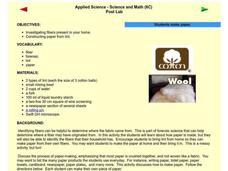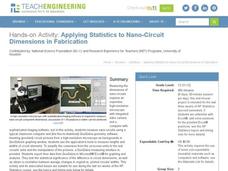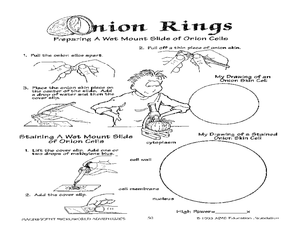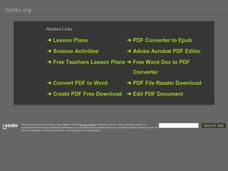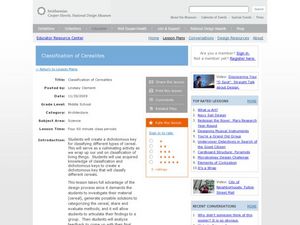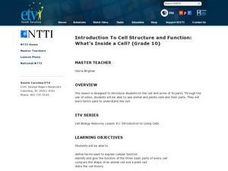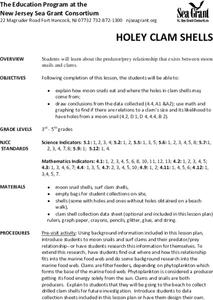Discovery Education
Fuss About Dust
Dust is everywhere around us; it's unavoidable. But what exactly is dust and are certain locations dustier than others? These are the questions students try to answer in an interesting scientific investigation. Working independently or...
Curated OER
Focusing on Lenses
Students explore scientific observations by examining the parts of a microscope. For this optics lesson, students discuss the importance of a focal point and focal distance when utilizing an optical device such as a microscope. Students...
Curated OER
Biology: Understanding Cellular Organelles
Learners distinguish the differences between Prokaryotic and Eukaryotic cells. Using microscopes, they examine a variety of plant and animal cells. Working in groups, they draw and label plant and animal cells and show the mathematical...
Curated OER
Creating a Universally Designed Lesson Plan
Young scholars investigate plant cells. In this multiple intelligences instructional activity, students engage in a variety of activities to foster an understanding of plant cells and how they work. Young scholars read, write, observe,...
TryEngineering
What is a Nanometer?
Exactly how small is a nanometer? Scholars investigate the scale of a nanometer by measuring classroom objects and converting these measurements to nanometers.
Curated OER
Applied Science - Science and Math Post Lab
Students construct paper. In this applied Science lesson plan, students create paper using lint. Students investigate the different fibers in their homes.
Teach Engineering
Applying Statistics to Nano-Circuit Dimensions in Fabrication
Do flexible circuits change dimensions during fabrication? Groups use GeoGebra software to measure the length of pictures of flexible nano-circuits. To determine if the circuits change dimensions, future engineers use Microsoft...
Curated OER
Taking Estimation and Measurement Outside
Eighth graders gain a better understanding of visual distances and estimation. They actively practice using metric measurement and conversion. Students practice cooperative exploring and team building.
Curated OER
Onion Cells
Students observe the cells of an onion by wet mounting it and viewing it in a microscope. In this hands on lesson plan students make their own wet mount slide of an onion and are able to identify the cells in it such as, the...
National Nanotechnology Infrastructure Network
The Micro and Macro World Around Us
Don't let your eyes play tricks on you ... use scale to keep your eyes in check! Young scholars observe images without scale and try to identify the structure. Then, they look at the same image with a scale bar and assess whether their...
Michigan State University
Gases Matter
Young scientists learn that seeing isn't necessarily believing when it comes to the states of matter. After performing a fun class demonstration that models the difference between solids, liquids, and gases, children complete a series of...
Curated OER
The Great Archeological Dig
Learners explore biology by identifying a diagram. In this cell anatomy lesson, students read a story about archeology and conduct a fictitious archeology dig in class in which they search for animal cells. Learners define a list of...
Curated OER
Scientific Notation
Students explore the concept of expressing numbers in scientific notation. In this scientific notation lesson, students understand the importance of using scientific notation by finding real world examples where scientific notation is...
Curated OER
Water Quality Monitoring
Students study the water quality of a stream in their area, by measuring the temperature, pH, alkalinity and conductivity. They integrate biology with earth science when using the microscope to study the living organisms in the water.
Curated OER
It's Fun to Learn!
Students use the macro mode of the OLYMPUS FE-140 CAMERAS as virtual microscopes to explore different habitats, observe plants, soil, and insects and other creatures. They download those images on electronic files and build web pages....
Curated OER
One Square Meter
Students examine various ecosystems using scientific inquiry. Using the local area, they assess the characteristics and conditions in one square meter. They report their findings in the form of a survey map and data sheet. They...
Curated OER
Biomagnification
Young scholars use real data to create an algebraic equation. They explain how the build up of small levels of contaminates can quickly become detrimental to species higher in the food chain.
Curated OER
Conduction, Convection, Radiation, Oh My!
Middle schoolers draw a line graph, and use graphing as a tool to discover more about conduction, convection and radiation. They should design their own experiment using heat sensitive paper to show they explain these 3 processes.
Curated OER
A Distant View
Students investigate the essential concepts of how lenses work to magnify vision, and then build simple telescopes to demonstrate their understanding. They write a description of how their telescope could be improved and how it works.
Curated OER
Classification of Cerealites
Middle schoolers create a dichotomous key. In this categorizing lesson, students create a dichotomous key for different types of cereal. Middle schoolers classify the cereal into groups such as flakes and cereal with holes. Students...
Curated OER
Introduction To Cell Structure and Function: What's Inside a Cell?
Tenth graders are introduced to the cell and some of its parts. Through the use of video, 10th graders see animal and plants cells and their parts. They learn terms used to explain the cell.
Curated OER
Holey Clamshells
Pupils analyze data to make hypotheses and conclusions regarding the predator/prey relationship between moon snail and surf clams.
Curated OER
Interdisciplinary Approach to Investigating Popcorn
Students conduct a lab experiment using the scientific method. In this interdisciplinary lesson plan, students will test the difference in popping white and yellow corn. Students will write their lab report in their science, math,...
Curated OER
Applied Science - Science and Math Pre Lab
Students explore human senses. In this applied Science lesson, students utilize their senses to distinguish various objects. Students explain their descriptions.





